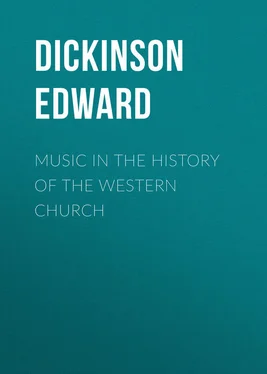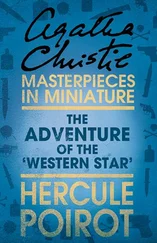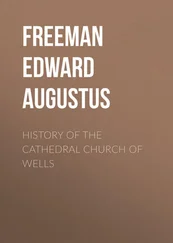Edward Dickinson - Music in the History of the Western Church
Здесь есть возможность читать онлайн «Edward Dickinson - Music in the History of the Western Church» — ознакомительный отрывок электронной книги совершенно бесплатно, а после прочтения отрывка купить полную версию. В некоторых случаях можно слушать аудио, скачать через торрент в формате fb2 и присутствует краткое содержание. Жанр: foreign_antique, foreign_prose, на английском языке. Описание произведения, (предисловие) а так же отзывы посетителей доступны на портале библиотеки ЛибКат.
- Название:Music in the History of the Western Church
- Автор:
- Жанр:
- Год:неизвестен
- ISBN:нет данных
- Рейтинг книги:4 / 5. Голосов: 1
-
Избранное:Добавить в избранное
- Отзывы:
-
Ваша оценка:
- 80
- 1
- 2
- 3
- 4
- 5
Music in the History of the Western Church: краткое содержание, описание и аннотация
Предлагаем к чтению аннотацию, описание, краткое содержание или предисловие (зависит от того, что написал сам автор книги «Music in the History of the Western Church»). Если вы не нашли необходимую информацию о книге — напишите в комментариях, мы постараемся отыскать её.
Music in the History of the Western Church — читать онлайн ознакомительный отрывок
Ниже представлен текст книги, разбитый по страницам. Система сохранения места последней прочитанной страницы, позволяет с удобством читать онлайн бесплатно книгу «Music in the History of the Western Church», без необходимости каждый раз заново искать на чём Вы остановились. Поставьте закладку, и сможете в любой момент перейти на страницу, на которой закончили чтение.
Интервал:
Закладка:
Edward Dickinson
Music in the History of the Western Church / With an Introduction on Religious Music Among Primitive and Ancient Peoples
PREFACE
The practical administration of music in public worship is one of the most interesting of the secondary problems with which the Christian Church has been called upon to deal. Song has proved such a universal necessity in worship that it may almost be said, no music no Church. The endless diversity of musical forms and styles involves the perennial question, How shall music contribute most effectually to the ends which church worship has in view without renouncing those attributes upon which its freedom as fine art depends?
The present volume is an attempt to show how this problem has been treated by different confessions and in different nations and times; how music, in issuing from the bosom of the Church, has been moulded under the influence of varying ideals of devotion, liturgic usages, national temperaments, and types and methods of expression current in secular art. It is the author’s chief purpose and hope to arouse in the minds of ministers and non-professional lovers of music, as well as of church musicians, an interest in this branch of art such as they cannot feel so long as its history is unknown to them. A knowledge of history always tends to promote humility and reverence, and to check the spread of capricious perversions of judgment. Even a feeble sense of the grandeur and beauty of the forms which ecclesiastical music has taken, and the vital relation which it has always held in organized worship, will serve to convince a devoted servant of the Church that its proper administration is as much a matter of concern to-day as it ever has been in the past.
A few of the chapters in this work have appeared in somewhat modified form in the American Catholic Quarterly Review , the Bibliotheca Sacra , and Music . The author acknowledges the permission given by the editors of these magazines to use this material in its present form.
CHAPTER I
PRIMITIVE AND ANCIENT RELIGIOUS MUSIC
Leon Gautier, in opening his history of the epic poetry of France, ascribes the primitive poetic utterance of mankind to a religious impulse. “Represent to yourselves,” he says, “the first man at the moment when he issues from the hand of God, when his vision rests for the first time upon his new empire. Imagine, if it be possible, the exceeding vividness of his impressions when the magnificence of the world is reflected in the mirror of his soul. Intoxicated, almost mad with admiration, gratitude, and love, he raises his eyes to heaven, not satisfied with the spectacle of the earth; then discovering God in the heavens, and attributing to him all the honor of this magnificence and of the harmonies of creation, he opens his mouth, the first stammerings of speech escape his lips – he speaks; ah, no, he sings, and the first song of the lord of creation will be a hymn to God his creator.”
If the language of poetical extravagance may be admitted into serious historical composition, we may accept this theatrical picture as an allegorized image of a truth. Although we speak no longer of a “first man,” and although we have the best reasons to suppose that the earliest vocal efforts of our anthropoid progenitors were a softly modulated love call or a strident battle cry rather than a sursum corda ; yet taking for our point of departure that stage in human development when art properly begins, when the unpremeditated responses to simple sensation are supplemented by the more stable and organized expression of a soul life become self-conscious, then we certainly do find that the earliest attempts at song are occasioned by motives that must in strictness be called religious. The savage is a very religious being. In all the relations of his simple life he is hedged about by a stiff code of regulations whose sanction depends upon his recognition of the presence of invisible powers and his duties to them. He divines a mysterious presence as pervasive as the atmosphere he breathes, which takes in his childish fancy diverse shapes, as of ghosts, deified ancestors, anthropomorphic gods, embodied influences of sun and cloud. In whatever guise these conceptions may clothe themselves, he experiences a feeling of awe which sometimes appears as abject fear, sometimes as reverence and love. The emotions which the primitive man feels under the pressure of these ideas are the most profound and persistent of which he is capable, and as they involve notions which are held in common by all the members of the tribe (for there are no sceptics or nonconformists in the savage community), they are formulated in elaborate schemes of ceremony. The religious sentiment inevitably seeks expression in the assembly – “the means,” as Professor Brinton says, “by which that most potent agent in religious life, collective suggestion, is brought to bear upon the mind” – the liturgy, the festival, and the sacrifice. 1 1 Brinton, The Religions of Ancient Peoples.
By virtue of certain laws of the human mind which are evident everywhere, in the highest civilized condition as in the savage, the religious emotion, intensified by collective suggestion in the assembly, will find expression not in the ordinary manner of thought communication, but in those rhythmic and inflected movements and cadences which are the natural outlet of strong mental excitement when thrown back upon itself. These gestures and vocal inflections become regulated and systematized in order that they may be permanently retained, and serve in their reaction to stimulate anew the mental states by which they were occasioned. Singing, dancing, and pantomime compose the means by which uncivilized man throughout the world gives expression to his controlling ideas. The needed uniformity in movement and accent is most easily effected by rhythmical beats; and as these beats are more distinctly heard, and also blend more agreeably with the tones of the voice if they are musical sounds, a rude form of instrumental music arises. Here we have elements of public religious ceremony as they exist in the most highly organized and spiritualized worships, – the assemblage, where common motives produce common action and react to produce a common mood, the ritual with its instrumental music, and the resulting sense on the part of the participant of detachment from material interests and of personal communion with the unseen powers.
The symbolic dance and the choral chant are among the most primitive, probably the most primitive, forms of art. Out of their union came music, poetry, and dramatic action. Sculpture, painting, and architecture were stimulated if not actually created under the same auspices. “The festival,” says Prof. Baldwin Brown, “creates the artist.” 2 2 Brown, The Fine Arts .
Festivals among primitive races, as among ancient cultured peoples, are all distinctly religious. Singing and dancing are inseparable. Vocal music is a sort of chant, adopted because of its nerve-exciting property, and also for the sake of enabling a mass of participants to utter the words in unison where intelligible words are used. A separation of caste between priesthood and laity is effected in very early times. The ritual becomes a form of magical incantation; the utterance of the wizard, prophet, or priest consists of phrases of mysterious meaning or incoherent ejaculations.
The prime feature in the earlier forms of worship is the dance. It held also a prominent place in the rites of the ancient cultured nations, and lingers in dim reminiscence in the processions and altar ceremonies of modern liturgical worship. Its function was as important as that of music in the modern Church, and its effect was in many ways closely analogous. When connected with worship, the dance is employed to produce that condition of mental exhilaration which accompanies the expenditure of surplus physical energy, or as a mode of symbolic, semi-dramatic expression of definite religious ideas. “The audible and visible manifestations of joy,” says Herbert Spencer, “which culminate in singing and dancing, have their roots in instinctive actions like those of lively children who, on seeing in the distance some indulgent relative, run up to him, joining one another in screams of delight and breaking their run with leaps; and when, instead of an indulgent relative met by joyful children, we have a conquering chief or king met by groups of his people, there will almost certainly occur saltatory and vocal expressions of elated feeling, and these must become by implication signs of respect and loyalty, – ascriptions of worth which, raised to a higher power, become worship.” 3 3 Spencer, Professional Institutions: Dancer and Musician .
Интервал:
Закладка:
Похожие книги на «Music in the History of the Western Church»
Представляем Вашему вниманию похожие книги на «Music in the History of the Western Church» списком для выбора. Мы отобрали схожую по названию и смыслу литературу в надежде предоставить читателям больше вариантов отыскать новые, интересные, ещё непрочитанные произведения.
Обсуждение, отзывы о книге «Music in the History of the Western Church» и просто собственные мнения читателей. Оставьте ваши комментарии, напишите, что Вы думаете о произведении, его смысле или главных героях. Укажите что конкретно понравилось, а что нет, и почему Вы так считаете.












